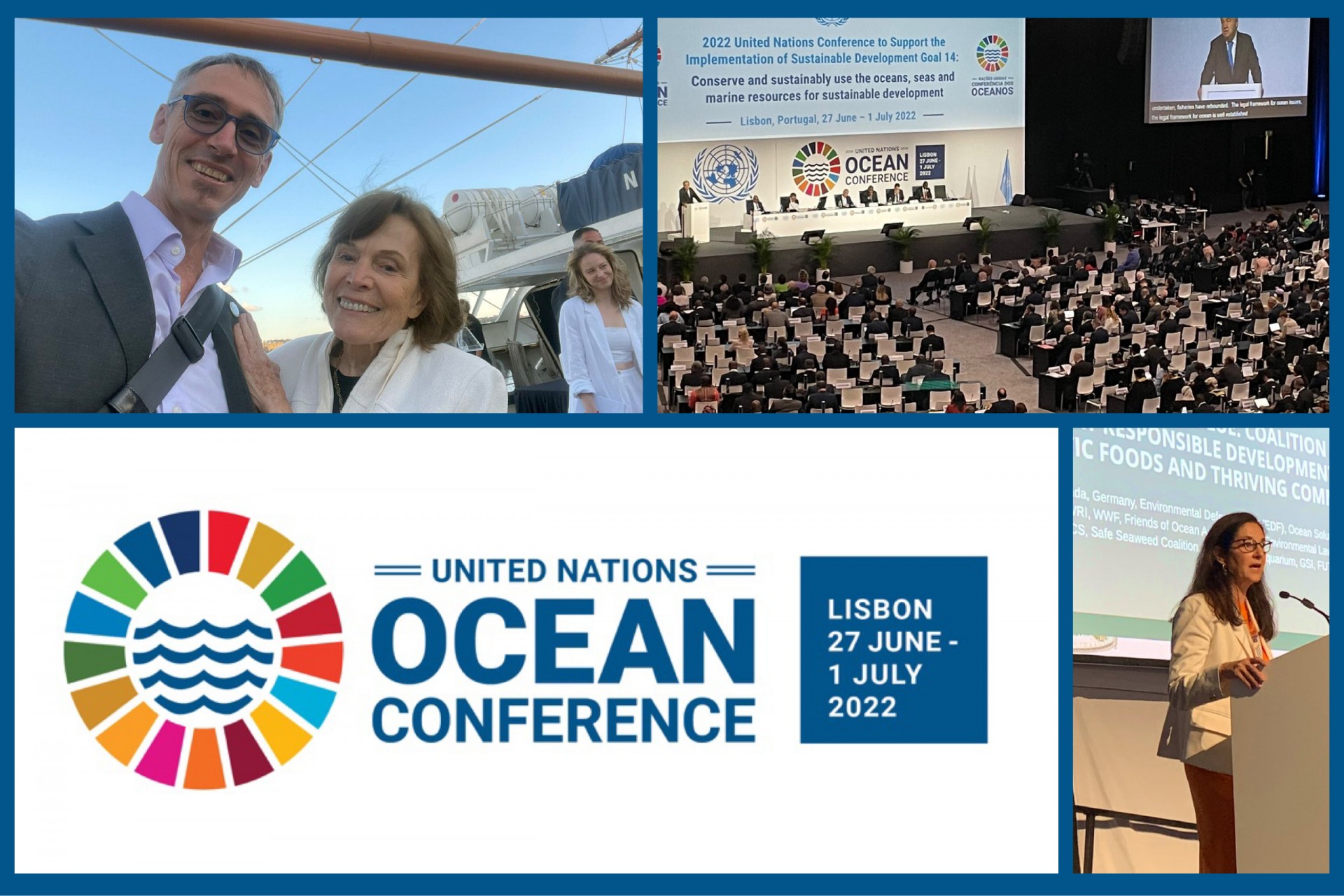Special
events
STRI special events,
June 2022
UN Oceans Conference 2022, COLACMAR, #EarthOptimism, McGill Neotropical Option Reboots and more.
UN Oceans Conference 2022
Driving science-based ocean health initiatives to meet the 2030 United Nations development goals, sustainability leaders represented the United States at the UN Ocean Conference in Lisbon, Portugal from Jun. 27 – Jul. 1. STRI director Josh Tewksbury represented the Smithsonian Institution on the US delegation with John Kerry, US Special Envoy for Climate, and reps from other agencies. Josh offers STRI research findings to government leaders for ocean conservation planning across borders and seeks research partners and support for the Our Ocean Conference to be held in Panama in Mar. 2023. He will continue to define an agenda for international ocean research and education with SI science leadership. Follow Josh on Twitter @tewksjj
Together again
Thanks to the Academic Programs and Special events offices for organizing an amazing fellows symposium, poster session and plenary talk by Boston University herpetologist, Karen Warkentin.
Regional Ocean Science Meeting, COLACMAR
Panama’s BioMuseo hosted a press conference announcing the Congreso Latinoamericano de Ciencias del Mar (Latin American Ocean Science Conference, COLACMAR) to be held in Panama from Sept. 19-23, 2022. STRI’s Marine and Coastal Advisor, Juan Mate, announced 35 fellowships for students from the Universidad Marítima Internacional de Panamá, UMIP. COLACMAR will bring together researchers and private companies engaged in sea science in the region who will present the newest science and tech innovations. The deadline for submitting abstracts is July 22, 2022.
Congratulations Carlos Jaramillo!
Both the International Biogeography Society (IBS) and the Paleontological Society honored STRI paleobiologist Carlos Jaramillo. At its biennial conference in Vancouver, the IBS named Jaramillo as a 2022 IBS Distinguished Fellow, a senior career award honoring important, long-term contributions to the field of biogeography. He became a fellow of the Paleontological Society “for his exceptionally productive research career, which transformed our understanding of the origin of modern Neotropical forests; for his service to our profession, including his ongoing bilingual commitment to the Hispanic community; and for his efforts mentoring and inspiring future paleontologists among the almost 20% of the US population that is Spanish-speaking.”
Jaramillo and his team dig through deep-time in Central and South America to reveal how great extinctions caused by the collision of an asteroid with the earth 66 million years ago gave rise to modern rainforests filled with supersized snakes, turtles and crocodiles. Fossilized plant and animal remains tell them how the Isthmus of Panama rose starting about 25 million years ago to connect South and North America.
#EarthOptimism features the Agua Salud Project at the Smithsonian Folklife Festival
For anyone who will be in Washington, DC this week: The team from STRI’s Agua Salud Panama Canal reforestation research project will share the latest hopeful research relevant to reforesting and restoring tropical forests across the Americas. Jefferson Hall, project director will speak about the importance of conserving watersheds on Jun. 30 at 14:00, Katherine Sinecore, post-doctoral fellow, will speak on Jul. 1 at 15:00 and Adriana Tapia, project manager, will talk about Women and Conservation at 12:00 on Jul. 3.
Moving Up
Congratulations to Eleinis Ávila-Lovera, Earl S. Tupper post-doctoral fellow with plant physiologist Klaus Winter, who accepted a position as professor at the University of Utah. As a kid in Venezuela, Eleinis was intrigued by that grade-school experiment showing how celery takes up food coloring. Now she studies how plants, especially tropical plants with green, photosynthetic stems, resist drought, a timely topic given that drought frequency and severity is expected to increase with climate change.
McGill Neotropical Option Reboots
This year the McGill NEO graduate course, envisioned as a model of experience- and field-based education, restarted after the pandemic. This time, both graduate and undergraduate students were invited to join the course, which combined evolution and ecology with sustainability and conservation policy curriculum. Staff from both McGill and STRI share basic skills and aim to inspire students through visits with people working and living at labs and field stations and in indigenous communities in Darien province. Students experienced both forest and marine ecosystems at STRI’s Punta Culebra Nature Center, Barro Colorado Island, Gamboa Laboratory, Bocas del Toro Research Station, Isla Coiba, and the Agua Salud watershed project, and visited Pipeline Road in Soberania National Park, cloud forests near Boquete in western Panama. During the course, students also learned how to tell their stories, and how to best communicate science.
Barro Colorado Island Visits
STRI director Joshua Tewksbury participated in the Global Research Council meeting in Panama, moderating a panel on Science and Technology Workforce Development and later hosted international GRC guests on a tour of STRI’s tropical forest research station on Barro Colorado Island. Linette Dutari, Associate Director for Communications and Public Programs hosted Elizabeth González, director of the Panama Canal Museum, a Smithsonian Affiliate Museum and her team who will show an exhibit to celebrate 100 years of research on the island, in 2023.








